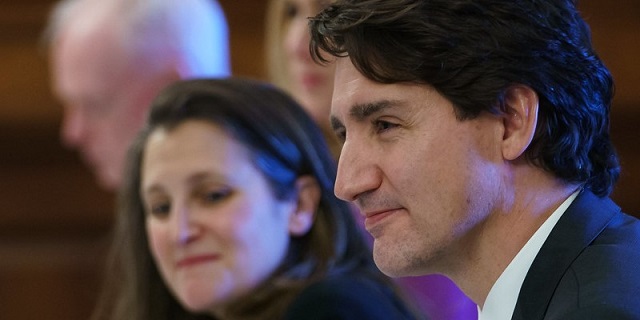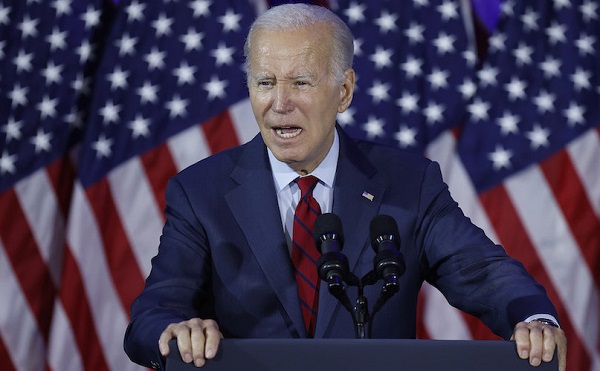Frontier Centre for Public Policy
Canada’s Leadership Vacuum Fueling a National Crisis

From the Frontier Centre for Public Policy
By David Leis
Canada is at a breaking point. Weak border security, unchecked organized crime, and rampant foreign interference have left the country dangerously exposed to threats that jeopardize its safety, economy, and sovereignty. Under Prime Minister Justin Trudeau’s leadership, these challenges have escalated to unprecedented levels, and no meaningful action has been taken to address them.
In British Columbia, a mother of two recently shared how the fentanyl crisis has ravaged her community. She spoke of losing friends and neighbours to overdoses, while her own family lives in fear of growing gang activity. Her story illustrates the human cost of systemic inaction and highlights the devastating consequences of a government unable to protect its people. It is a tragic reality mirrored in communities across the country, from urban centres to small towns, where drugs and crime are taking a growing toll.
Canada’s border management, a critical first line of defence, is failing to stem the tide of illicit goods and activities. The Canada Border Services Agency inspects less than two per cent of shipping containers entering the country, leaving ports like Vancouver vulnerable to transnational crime. According to the Cullen Commission, billions of dollars are laundered annually in British Columbia, often through casinos and real estate linked to organized crime. Transparency International’s 2022 report ranked Canada among the worst in the G7 for anti-money laundering enforcement, underlining systemic failures.
Weak border controls are exacerbating the fentanyl crisis. Precursor chemicals flow into Canada largely unchecked, often disguised as legitimate imports. Provincial officials in British Columbia have acknowledged the need for tighter regulations on pill presses, but federal laws remain inconsistent. The consequences are staggering: over 34,000 Canadians have died of opioid overdoses since 2016, according to Health Canada. These are not just numbers; they represent families shattered and communities in mourning. Yet, the federal government continues to respond with piecemeal measures instead of a comprehensive national strategy.
Concerns over foreign interference add another dimension to Canada’s vulnerability. Weak borders and lax enforcement also provide fertile ground for foreign actors to exploit. The recent inquiry into election interference revealed disturbing levels of meddling, with CSIS identifying instances of Chinese state funding for federal candidates. Hybrid warfare tactics – including cyberattacks, economic manipulation, and political interference – are well-documented. These activities undermine Canada’s sovereignty and erode trust in its democratic institutions.
International partners, particularly the United States, are taking notice. Canada’s largest trading partner has grown increasingly frustrated with these vulnerabilities. Under a potential Trump administration, Canada could face severe economic repercussions, including tariffs, if it does not address its security deficiencies. A report from the Global Initiative Against Transnational Organized Crime labelled Canada a “safe zone” for transnational crime, citing weak enforcement and limited co-ordination among intelligence agencies. Such critiques directly challenge Canada’s reputation and its role as a trusted ally.
Canada’s aging infrastructure compounds these security failures. A 2023 report from Statistics Canada revealed that nearly 40 per cent of the country’s infrastructure is nearing the end of its useful life. Ports, highways, and public utilities – critical for trade and national security – are underfunded and rapidly deteriorating. This hampers economic competitiveness and leaves Canada ill prepared to secure its supply chains. These failings highlight a broader issue: the government’s reluctance to prioritize foundational investments that ensure long-term stability.
Meanwhile, Canada’s regulatory framework struggles to keep pace with modern threats. The country lacks effective oversight to combat money laundering, cyberattacks, and supply chain exploitation. Organized crime and illicit trade drain billions from the economy every year. Weak border controls have made Canada a transit point for everything from drugs to counterfeit goods. Provincial attempts at regulation, like in British Columbia, have helped somewhat, but federal legislation has yet to catch up.
Canada’s challenges didn’t emerge overnight. They are the result of decades of underinvestment in security, weak enforcement, and a lack of political will. While the Trudeau government has failed to address these issues, previous administrations are responsible for creating the conditions that allowed them to fester.
However, the current government bears responsibility for the lack of urgency in the face of escalating crises. Performative policies, like token GST rebates, do little to address systemic issues. The Trudeau government has failed to modernize Canada’s security apparatus, prioritizing political optics over substantive reform.
Canada cannot afford to remain passive in the face of these mounting threats. The government must decisively modernize border security, combat organized crime, and confront foreign interference with meaningful legislation and enforcement. Countries like Australia have successfully implemented advanced port screening and stricter anti-money laundering laws to address similar issues. Canada must follow suit to regain control of its borders and restore trust in its institutions.
The stakes couldn’t be higher. Every uninspected container ship, every fentanyl overdose, and every election left vulnerable to interference represents a failure of leadership. The mother in B.C., fearing for her children’s future, is not alone – she represents countless Canadians who feel abandoned by a government unwilling to act. Her voice, and others like hers, demand attention.
This is no longer about politics or optics; it’s about safeguarding the nation’s future. The time for complacency has passed. Canada’s security, prosperity, and sovereignty depend on immediate, decisive leadership.
Anything less is unacceptable.
David Leis is President and CEO of the Frontier Centre for Public Policy and host of the Leaders on the Frontier podcast.
Business
It’s Time To End Canada’s Protectionist Supply Management Regime

From the Frontier Centre for Public Policy
Senior Fellow Brian Giesbrecht says it’s time to stop coddling millionaire dairy barons. Supply management drives up grocery bills, blocks trade and makes Canada a global joke. Australia fixed it—we can too.
Canadians are paying the price for political cowardice
Canada’s outdated supply management system forces the average Canadian family to spend $500 a year to protect a small group of wealthy dairy producers, most of them millionaires. This protectionist regime enriches a few at the expense of many, drives up food prices and undermines Canada’s credibility in trade negotiations. It no longer fits the times, and it has to go.
Let’s be clear: this isn’t about attacking dairy farmers. Most are hardworking, conscientious people who’ve built their lives around a system they didn’t create. They rise early, work long hours, rarely take holidays and deserve fair compensation if the system is dismantled. But good intentions don’t justify bad policy.
Under supply management, the government tightly controls how much dairy, poultry and eggs Canadian farmers can produce and imposes steep tariffs—sometimes more than 400 per cent—on imported products to limit competition. The result is artificially high prices, limited consumer choice and retaliatory tariffs from other countries.
This system, once designed to protect small family farms, is now dominated by fewer than 10,000 large operations, many worth millions. It no longer serves its original purpose, yet it remains in place because of political cowardice. Pierre Poilievre and Mark Carney both know the system is flawed but won’t challenge it. Why? Because it’s popular in Quebec, a province with significant electoral influence. No party wants to risk alienating those voters.
Australia and New Zealand once faced similar challenges. They phased out their systems, fairly compensated farmers through levies and built globally competitive dairy sectors. We can too. Trump’s return to power may force our hand, but it also gives us an opportunity to act on what we should have done long ago.
Even without outside pressure, the inefficiency is clear. Every year, billions of litres of milk are dumped when quotas are exceeded. At the same time, Canadian companies like Saputo are forced to relocate abroad to reach global markets. Our artisan cheese producers are trapped in a small domestic economy while foreign markets block our exports in retaliation for our own protectionism.
The hypocrisy is glaring. We call for free trade but defend a system that imposes up to 400 per cent tariffs on imports. Our global partners are right to scoff.
Trump did. In a social media post, he wrote: “Canada is a very difficult country to TRADE with, including the fact that they have charged our Farmers as much as 400 per cent Tariffs, for years, on Dairy Products.” And in his July 10 letter announcing 35 per cent tariffs on Canadian goods, he added: “Canada charges extraordinary Tariffs to our Dairy Farmers—up to 400 per cent—and that is even assuming our Dairy Farmers even have access to sell their products to the people of Canada.”
This isn’t just an American objection. High-quality dairy from France and Germany can’t be sold in Canada because of our import barriers. Their governments respond by blocking our dairy exports. Canada loses jobs, investment and credibility.
Some defenders claim foreign dairy is unsafe. But countries like France and Germany have food safety standards as strict as ours. And Canada already has legal mechanisms to block substandard imports. We don’t need tariffs for that.
Former Liberal MP Martha Hall Findlay said it plainly: supply management is a dead end. So did Maxime Bernier, who made it a central issue during his bid for the Conservative leadership. The dairy lobby made sure he didn’t win. And we’re still stuck.
Now, all parties have voted to exclude supply management from current trade talks. We are entering negotiations that demand fair treatment while protecting one of the most unfair systems in the developed world. It’s a national embarrassment.
But this can change. A phased buyout funded by a modest, temporary levy—not taxpayer dollars—could end supply management and open our dairy sector to global opportunity. Australia and New Zealand proved it works. Their citizens don’t pay $10 for butter or yogurt. Neither should we.
It’s time to stop protecting the past. Dismantle the system. Free our producers. Lower grocery bills. Restore our credibility.
Maxime Bernier saw it in 2017. Trump is saying it again in 2025.
This time, we’d better listen.
Brian Giesbrecht is a retired judge and senior fellow at the Frontier Centre for Public Policy.
Frontier Centre for Public Policy
Canada’s New Border Bill Spies On You, Not The Bad Guys

From the Frontier Centre for Public Policy
By Lee Harding
Lee Harding warns that the federal government’s so-called border bill lets officials snoop on your data, ban big cash payments and even open your mail – all without a warrant
Think Bill C-2 is about stopping fentanyl? Think again. It lets the feds snoop your data, open your mail and ban big cash payments – no warrant needed
The federal government is using the pretext of border security, the fentanyl crisis and transnational crime to push through Bill C-2, legislation that dangerously expands surveillance powers, undermines Canadians’ privacy and restricts financial freedom. This so-called Strong Borders Act is less about protecting borders and more about policing citizens.
Bill C-2, a 130-page omnibus bill introduced on June 3, grants broad new powers to government agencies to spy on Canadians and share personal information with foreign countries. A more honest title might be the Snoop and Gossip Act.
Among its most intrusive provisions, the bill would make it illegal for any business, profession or charity to accept cash payments over $10,000, even if made in smaller, related transactions. Want to pay a contractor $10,001 in five separate payments for home renovations? Too bad.
The Justice Centre for Constitutional Freedoms quickly condemned the move. “Restricting the use of cash is a dangerous step toward tyranny and totalitarianism,” the organization posted to X. “Cash gives citizens privacy, autonomy, and freedom from surveillance by government and by banks.”
Under Bill C-2, internet service providers could be compelled—under threat of fines—to hand over names, locations and “pseudonyms” of users without a warrant. Any peace officer or public officer can demand this data by merely claiming “reasonable grounds to suspect” an offence “has been or will be committed.”
It doesn’t stop there. The bill would also authorize the government to open private mail under the same vague threshold of suspicion.
Experts in law and privacy say the bill is a massive overreach. University of Ottawa internet law scholar Michael Geist and Kate Robertson of the University of Toronto’s Citizen Lab both point out that successive federal governments have sought to expand internet surveillance for years, but Bill C-2 goes further than ever before.
“Bill C-2’s big brother tactics combine expansive warrantless disclosure with unprecedented secrecy,” Geist warns. He adds that the bill “overreaches by including measures on internet subscriber data that have nothing to do with border safety or security but raise privacy and civil liberties concerns.”
If the intent were truly to combat fentanyl trafficking and transnational crime, better tools already exist. Conservative MP Frank Caputo pointed out that the bill has 16 parts but says nothing about increasing penalties or jail time for fentanyl traffickers.
“There is nothing about bail in the bill,” Caputo said during early debate on the bill. “In this omnibus bill, it says that offenders can serve their sentence for trafficking in fentanyl from their couch.”
Bloc Québécois MP Claude DeBellefeuille argued that strengthening border security requires more boots on the ground. Two rural border crossings in her riding recently had their staffed hours cut in half.
“It is estimated that the CBSA (Canada Border Services Agency) already has a shortage of between 2,000 and 3,000 border services officers for current duties. If they are given new responsibilities, however necessary, there will be an even greater shortage,” she said.
Not only does Bill C-2 contradict Supreme Court precedent. It also sets the stage for Canada to share sensitive personal information with foreign governments. In 2014, the court ruled that Canadians have a “reasonable expectation of privacy in the subscriber information” provided to internet service providers and that police requests for such data amount to a “search” requiring a warrant.
Robertson warns that the bill not only defies this precedent but also enables Canada to share this dubiously acquired information with 49 other countries under the Second Additional Protocol to the Cybercrime Convention. Canada signed the agreement in 2023 but hasn’t ratified it. Bill C-2 would make that possible.
She calls the protocol’s weak human rights safeguards “a direct threat to existing protections under international human rights law.” Robertson co-authored a submission urging the Department of Justice to reject the 2AP and instead support data-sharing frameworks that are built on consistent rights protections across all signatories.
Further complicating matters, Canada is in negotiations with the United States over a data-sharing agreement under that country’s CLOUD Act. Canada’s willingness to comply may reflect lingering trade pressures from the Trump administration, pressures that could again push Canada to compromise its legal independence and citizens’ rights.
This bill should be scrapped or thoroughly revised. Canadians should not have to surrender their privacy and human rights to serve a global law enforcement agenda that disregards civil liberties. If the line between national security and authoritarianism is erased, the greatest threat to Canadians may no longer be drug traffickers—it may be their own government.
Lee Harding is a research fellow at the Frontier Centre for Public Policy.
-

 Energy2 days ago
Energy2 days agoActivists using the courts in attempt to hijack energy policy
-

 National2 days ago
National2 days agoCanada’s immigration office admits it failed to check suspected terrorists’ background
-

 Daily Caller2 days ago
Daily Caller2 days agoWhat Happened in Butler, PA?
-

 Crime1 day ago
Crime1 day agoDEA Busts Canadian Narco Whose Chinese Supplier Promised to Ship 100 Kilos of Fentanyl Precursors per Month From Vancouver to Los Angeles
-

 Business1 day ago
Business1 day agoCanada must address its birth tourism problem
-

 Alberta2 days ago
Alberta2 days agoAlberta ban on men in women’s sports doesn’t apply to athletes from other provinces
-

 Alberta1 day ago
Alberta1 day agoMedian workers in Alberta could receive 72% more under Alberta Pension Plan compared to Canada Pension Plan
-

 International1 day ago
International1 day agoBiden autopen scandal: Did unelected aides commit fraud during his final days in office?





